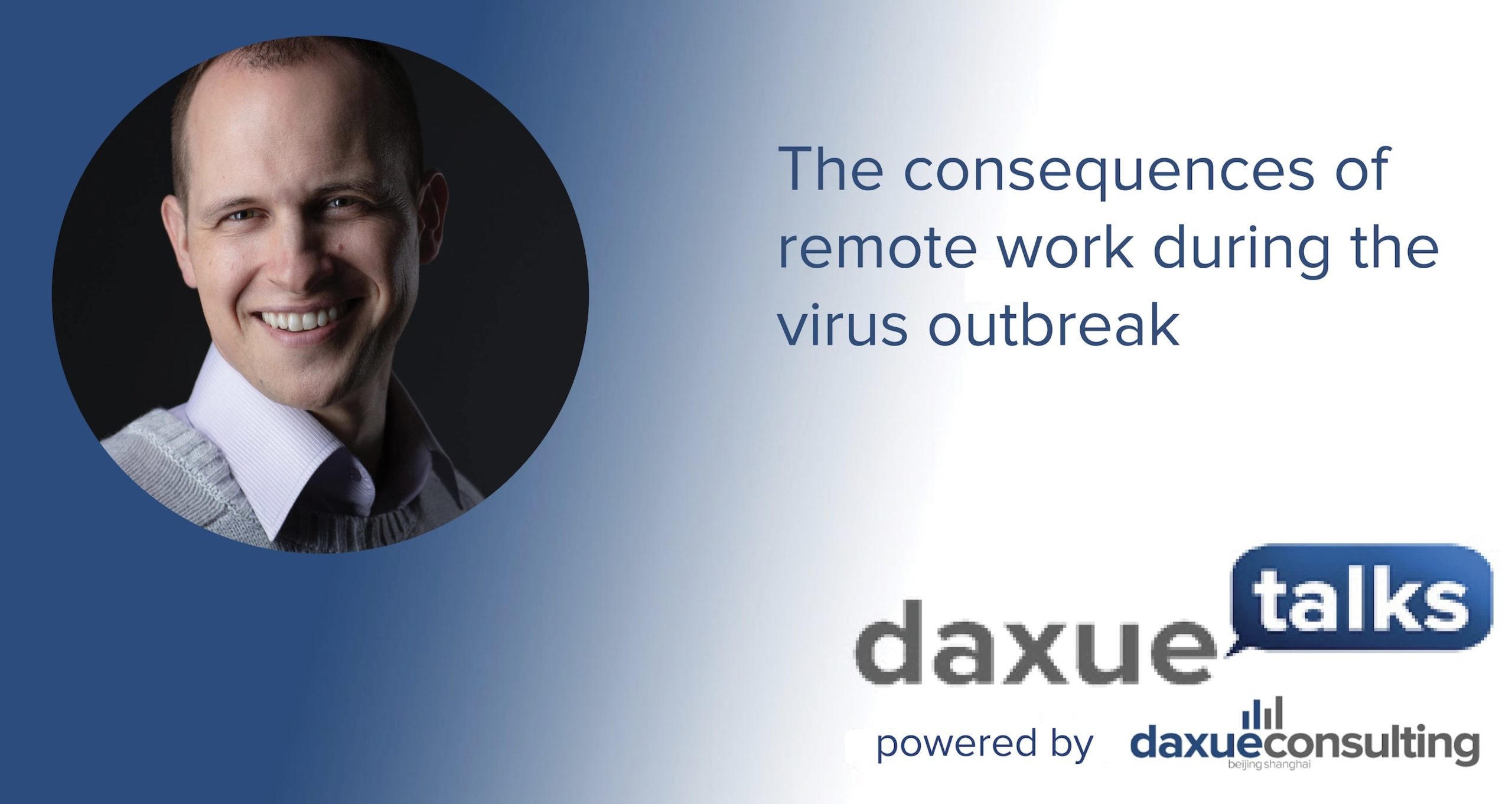Daxue Talks transcript #47: The consequences of remote work during the virus outbreak
In this episode of Daxue Talks David Ammerschlaeger, a psychologist and the head of psychology at ChingHo clinic, discusses the consequences of remote work during the virus outbreak.
Full transcript below:
Welcome to Daxue Talks, a show powered by Daxue Consulting, a China-based strategic market research company founded in 2010.
My name is David Ammerschlaeger, I am a psychologist and I am the head of psychology at ChingHo clinic. I am also an executive coach and a member of the shanghai international mental health association and the British Psychological Society and I am very happy to be here tonight.
Many people have adapted to closed offices and logged down by working from home. What consequences have you observed from the new way of working together?
As I mentioned before, the Chinese Psychological Society has found important surges in psychological distress over the last few weeks, especially for anxiety, trauma, depression and there are many other things going on. In addition to that, businesses have been suffering a lot as well and because the economy was already under a lot of strain, I think we can assume that this is one of the economies’ biggest challenges for decades.
So, in this situation of uncertainty, hardship, distress, people are on edge basically. People for their employment, for their job, they don’t know if they’re going to get a bonus, or maybe – I’ve heard companies that are actually cutting down all the salary increases for the current year. So, you don’t really know what is going to be happening.
Lacking communication information amongst colleagues and within the teams can lead – in this context to a lot of tension, frustration and conflicts. So, what happens right now is that this current situation brings everything into one place. That’s actually home. Family, work and everything and that’s very dangerous and difficult for people because something that is very important is to keep healthy boundaries between the different aspects of your life and that’s true between people but also between tasks and activities that you’re performing during the day.
The other thing is that when you are working in an office environment, you are getting used to people around you, so actually your attention is trained to let go of other people’s presence, the noises and whatever is going on around you. When you’re working from home, the whole setting is different. If you don’t have a family you might welcome the quiet and the calm, but actually, very quickly you might feel lonely and isolated and then you want to watch TV, play video games or maybe connect with other people on social media because you feel lonely and disconnected from the world. On the other side, if you have a family and if the whole family is here, sometimes it’s difficult to set boundaries and to tell your children and your parents to let you alone and to work. And it increases the burden, even the children might suffer from that and they might not understand why suddenly their dad or their mother is saying – leave me alone, let me work, and they might feel rejected, punished, or anyway sad and any other way. So, this can also create conflicts between spouses and within the family to know who is taking care of these children. And for teams, it means that very quickly people must find a new way to work together. Many managers are not used to this and feel insecure, uncomfortable and stressed because of this situation because they are not used to that and right now, they don’t have the habits, the ways of working through this whole process.
I have seen many bad reactions where people have been mixing their own feelings of insecurity, their lack of confidence or fear of feeling useless and many people want also, for example, to assert themselves their existence to say – hey I am here and so they start to be noisier in meetings, to become very authoritarian, harsh and so on and that’s very counterproductive in many cases.
Is there a tendency towards more conflicts at work during a period of anxiety like the current virus outbreak?
Yeah definitely. As I indicated probably just now, and research has shown that anxiety, in general, has significant effects on conflict and relation but also on making conflict resolution more difficult. In cases of fear, conflicts also tend to be solved by responses increasing suppressed emotions like frustration, anger, sadness, feeling of rejection and it can even lead to paranoia. Several research studies from the early 2000s have shown that anxiety also interferes with attention performance. So, the reason behind that is that emotional processing is most of the time prioritized by our brains before the cognitive processing. It means that whenever there is something emotionally tough for us, actually our rational mind shuts down and our emotional mind lights up and tries to process and digest this first.
So for this reason, anxious people, compared to non-anxious people, maybe more susceptible to disruptions and attention because they devote more – focus more energy in the emotional processing than other people and they will try to process all the anxiety-related information or the hardship, whatever is actually psychologically triggering their distress.
Another research has shown that fear and anxiety hinders objective processing of information and sound decision making. So, to explain that – sometimes stress is increasing more performance to a certain degree right, and that’s what sometimes we experience as the efficiency stress or whenever we feel stressed and we feel super, super motivated and performant, so this is I would say healthy levels of stress and it makes us more performant but this stage can only last for a certain time, and it’s not sustainable in working overtime. So, at some point, this stress becomes unbearable and results in psychological fatigue and possible burn out which increases also here the risk of tensions and conflicts. Cause whenever we have this situation where people are more and more emotionally charged, actually they are discharging this inner tension towards other people, and because they are at home, lonely and isolated, they can do that directly against the colleagues and it can affect team performance and team understanding during the conflict.
Any questions? We will find an expert to answer them. Drop your questions in the comments or send us an email – dx@daxueconsulting.com.















